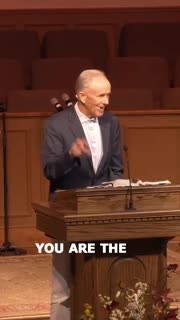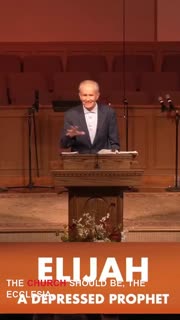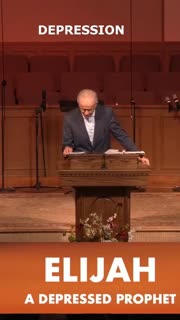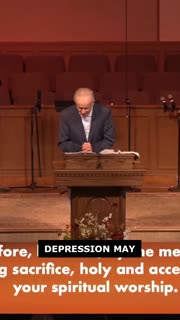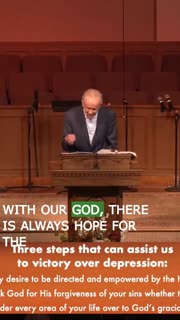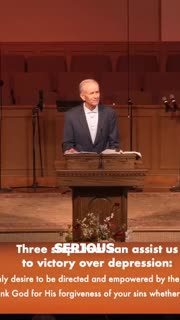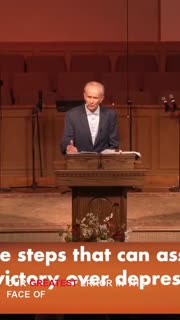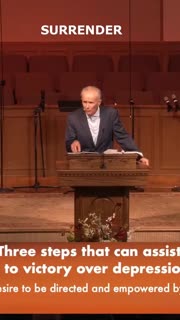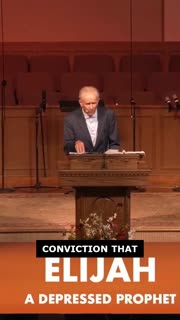Finding Hope and Healing in Depression
Devotional
Sermon Summary
Bible Study Guide
Sermon Clips
### Quotes for Outreach
1. "You are the backbone of the future. It's obvious that you don't have a senior pastor, you don't have your staff in place like you need to have, you will have in the days ahead. But you're continuing to work, serve, honor, and God-saving people, adding to your church in the first service. Your worship is incredible, so I'm just thankful to be a part of a special day, like today." [40:36] (26 seconds)
2. "The church should be, the ecclesia, God's called out people, all of us that are saved, the church should be one of the safest places, to share our frustrations, to share our hurts, to share our temptations, to share our vulnerabilities. The church should be a safe place. But what's happened through the course of time, it's become a place that's probably not really that safe." [47:53] (25 seconds)
3. "Depression is much more than just a case of the blues. Depression is much more than just having a bad day. Every one of us in here probably had a bad day. We had a bad day. We had a bad day. We had a bad day. We had a bad day. Many of us will have a bad day, possibly today. You'll get a text message that'll change your life. You'll get a phone call. You'll get a knock on the door. You'll get a piece of mail tomorrow that'll change your life." [50:30] (23 seconds)
4. "Depression may be in your life today, but it doesn't have to stay. It can be moved out by the grace of God, and we can be like the Psalmist, and we can be like Paul. And I close with this thought. It is not wrong to be depressed. But it is wrong for the child of God to stay depressed. We go through seasons in life. We go through challenges. We go through situations. But it is wrong, and not especially helpful in overcoming a depressed state, to give up on the Lord when you're depressed." [01:26:14] (37 seconds)
5. "With our God, there is always hope for the problems that we face. Every head bowed, and every person today that knows the value of prayer, the value of the Word, I ask you to think through what God's trying to do in your heart and your life right now. Just like these young people have experienced a high, this weekend, they'll walk out into a world tomorrow, even this afternoon, that they'll have to call back and remember how God was faithful to them this weekend." [01:27:13] (30 seconds)
### Quotes for Members
1. "Be really careful who you exclude in your life when you may need them just days after you exclude them. Be really careful who you don't let speak into your life when God needs to speak into you through other people. John Baker, a great independent preacher, said this, A juniper tree or a broom tree deep in the wilderness has room for only one person under it. In other words, God wasn't going to let Elijah invite a bunch of people to his pity party." [01:11:54] (38 seconds)
2. "Depression is a serious affliction that produces, it produces fear even in the strongest of God's children. And we must bring our fears captive to the Lord. We must take every fear, every stronghold, as Paul says in 2 Corinthians chapter 4, under the power of Jesus Christ. We must do that." [01:23:45] (19 seconds)
3. "Our greatest error in the face of depression is to privatize our pain. Our greatest problem when we go through problems is not letting other people into our world. I understand the risk. I understand that there's, you better, you better be really careful who you share your transparencies with, right? And when a person comes to you and shares their vulnerabilities, their weaknesses, their hurts, tag dudes, you're it." [01:20:15] (33 seconds)
4. "Surrender is when I raise my hands. Surrender as you worship this morning, as you raise your hands, means I give up. It means I take my hands off of it, Lord. The first thing a person does when they get robbed at gunpoint is the guy doing the robbing sticks the gun in their back or their stomach or whatever, and the first thing you do is, I give up. Did you know that's what God wants me to do? Did you know that's what God wants you to do?" [01:22:51] (28 seconds)
5. "I have a deep conviction that all of us will face, as I've said, periods, not situations that may last for long, long periods of time, but even short periods of time, that deal with loneliness, discouragement, isolation. We rub shoulders every day with people who are desperate, hurting, and lonely. Now, let me make an observation. This room is full, and that's a good thing, but what's it full of? I promise you there's hurt here." [52:05] (29 seconds)
Ask a question about this sermon
1. "You are the backbone of the future. It's obvious that you don't have a senior pastor, you don't have your staff in place like you need to have, you will have in the days ahead. But you're continuing to work, serve, honor, and God-saving people, adding to your church in the first service. Your worship is incredible, so I'm just thankful to be a part of a special day, like today." [40:36] (26 seconds)
2. "The church should be, the ecclesia, God's called out people, all of us that are saved, the church should be one of the safest places, to share our frustrations, to share our hurts, to share our temptations, to share our vulnerabilities. The church should be a safe place. But what's happened through the course of time, it's become a place that's probably not really that safe." [47:53] (25 seconds)
3. "Depression is much more than just a case of the blues. Depression is much more than just having a bad day. Every one of us in here probably had a bad day. We had a bad day. We had a bad day. We had a bad day. We had a bad day. Many of us will have a bad day, possibly today. You'll get a text message that'll change your life. You'll get a phone call. You'll get a knock on the door. You'll get a piece of mail tomorrow that'll change your life." [50:30] (23 seconds)
4. "Depression may be in your life today, but it doesn't have to stay. It can be moved out by the grace of God, and we can be like the Psalmist, and we can be like Paul. And I close with this thought. It is not wrong to be depressed. But it is wrong for the child of God to stay depressed. We go through seasons in life. We go through challenges. We go through situations. But it is wrong, and not especially helpful in overcoming a depressed state, to give up on the Lord when you're depressed." [01:26:14] (37 seconds)
5. "With our God, there is always hope for the problems that we face. Every head bowed, and every person today that knows the value of prayer, the value of the Word, I ask you to think through what God's trying to do in your heart and your life right now. Just like these young people have experienced a high, this weekend, they'll walk out into a world tomorrow, even this afternoon, that they'll have to call back and remember how God was faithful to them this weekend." [01:27:13] (30 seconds)
### Quotes for Members
1. "Be really careful who you exclude in your life when you may need them just days after you exclude them. Be really careful who you don't let speak into your life when God needs to speak into you through other people. John Baker, a great independent preacher, said this, A juniper tree or a broom tree deep in the wilderness has room for only one person under it. In other words, God wasn't going to let Elijah invite a bunch of people to his pity party." [01:11:54] (38 seconds)
2. "Depression is a serious affliction that produces, it produces fear even in the strongest of God's children. And we must bring our fears captive to the Lord. We must take every fear, every stronghold, as Paul says in 2 Corinthians chapter 4, under the power of Jesus Christ. We must do that." [01:23:45] (19 seconds)
3. "Our greatest error in the face of depression is to privatize our pain. Our greatest problem when we go through problems is not letting other people into our world. I understand the risk. I understand that there's, you better, you better be really careful who you share your transparencies with, right? And when a person comes to you and shares their vulnerabilities, their weaknesses, their hurts, tag dudes, you're it." [01:20:15] (33 seconds)
4. "Surrender is when I raise my hands. Surrender as you worship this morning, as you raise your hands, means I give up. It means I take my hands off of it, Lord. The first thing a person does when they get robbed at gunpoint is the guy doing the robbing sticks the gun in their back or their stomach or whatever, and the first thing you do is, I give up. Did you know that's what God wants me to do? Did you know that's what God wants you to do?" [01:22:51] (28 seconds)
5. "I have a deep conviction that all of us will face, as I've said, periods, not situations that may last for long, long periods of time, but even short periods of time, that deal with loneliness, discouragement, isolation. We rub shoulders every day with people who are desperate, hurting, and lonely. Now, let me make an observation. This room is full, and that's a good thing, but what's it full of? I promise you there's hurt here." [52:05] (29 seconds)
